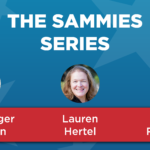The Sammies Series: Q&A with the Robertson Foundation for Government and a State Department lawyer leading the fight against global human rights abuses
Monica Ager Jacobsen, an attorney adviser in the State Department’s Office of the Legal Adviser, played a crucial behind-the-scenes role in shaping laws and policies that have enabled the U.S. government to impose sanctions against dozens of human rights abusers worldwide.
Jacobsen was honored as a 2020 Service to America Medals finalist in the Emerging Leaders category for this groundbreaking work. She spoke with the Robertson Foundation for Government’s President Cynthia Robinson and Communications Manager Lauren Hertel, about serving in the State Department and how the U.S. helps identify and promote accountability for human rights abuses.
Robinson: What led you to this work?
Jacobsen: My interest in human rights developed over time. By the time I made my career choice, I knew I was committed to public service and working on behalf of a bigger mission. Finding meaning in my day-to-day work was a priority for me in developing a career and figuring out where I wanted to commit my time and effort.
My level of responsibility helps make this role meaningful. I have the legal expertise to advise my colleagues on human rights sanctions and, in most cases, I am the only lawyer providing advice. Having this ownership over my work enabled me to develop my role within the bigger mission of government.
Robinson: What helps you maintain your focus and energy during these tough cases?
Jacobsen: A lot of my job is reading horrible stories about atrocities all over the world, which can be disheartening. My colleagues at the State Department, including those in the Office of Legal Adviser, keep me going. Every day I see that we are all working toward a bigger goal and committed to seeking justice for victims and repairing societies. We also recognize that having the U.S. government behind these efforts makes a huge difference in our engagements with other countries and nongovernmental organizations. When the U.S. speaks on these issues, people really listen.
Robinson: What are some of the outcomes you’ve seen as a result of your work?
Jacobsen: The path to justice is long, but our work with the Global Magnitsky sanctions program is calling attention to atrocities and other human rights abuses and violations that might not otherwise be on the front page of top newspapers. Publicly naming and shaming and creating financial consequences for those responsible for atrocities has a real effect. For example, in July, the United States imposed sanctions on China for its mass detention of the Uyghur population and members of other Muslim minority groups. The sanctions made these abuses a front-and-center news story.
In addition, I worked on the executive order underpinning the Global Magnitsky sanctions program, which declares a national emergency with regards to serious human rights abuses around the world, noting that they threaten our economic security, which in turn enables us to impose sanctions on those responsible. This is a novel approach that has helped us call attention to and create consequences for human rights abuses.
Hertel: What is your biggest accomplishment?
Jacobsen: For the past few years, I’ve served on the Office of the Legal Adviser’s recruiting and retention committee. In this role, I’ve recruited close to 40 of the 200 attorneys in our office. I’m invigorated by meeting and mentoring the new faces of public service and seeing their phenomenal work. They are part of the next generation that will carry the torch at the Office of the Legal Adviser and provide foreign policy and legal guidance on critical international issues.
Hertel: What advice would you offer lawyers who might be considering a career in public service?
Jacobsen: As an adult, you spend most of your time at work and you want that work to have meaning. Public service offers opportunities for young people to grow and develop a sense of ownership over their work on important, cutting-edge issues. Especially as a lawyer, I am involved in the decision-making process in a way that might not be possible outside government. Seeing the consequences of my work and the resulting policy changes brings immense satisfaction.
Hertel: What’s a myth about public service that you’d like to dispel?
Jacobsen: There’s a myth that working in public service means forgoing financial security. But many positions in the federal government offer good and consistent salaries and benefits, and that should not be discounted along with having a meaningful career. I am challenged every day, I believe in the mission that I am working on, I have stellar colleagues, and I have had the flexibility to work from home, even before COVID-19. The federal government offers work-life balance that can be hard to find in the private sector.
There is also a misconception that political parties can create huge shifts priorities throughout the government. Civil servants possess institutional memory and protect the rule of law regardless of which party holds office. By and large, most of our policy decisions are not political.
Hertel: Can youdescribe your experience as a Sammies finalist?
Jacobsen: I feel incredibly appreciative to be selected a finalist for this award. The public does not always realize how much government work impacts day-to-day life, so the Partnership’s efforts to promote this behind-the-scenes work is critical. The U.S. is a leader in pressing for justice and accountability on human rights issues, and I am proud to be part of that work. This experience has really hammered home for me that no matter the hardships or barriers, the government keeps chugging on.
Read Jacobsen’s Service to America Medals profile for more on her work imposing sanctions on human rights abusers and visit the Robertson Foundation for Government’s website for more on its public service work. To learn about this year’s Sammies virtual awards program, read our blog post, “Inspiring stories from this year’s Service to America Medals.”
Join the conversation with #Sammies2020 and follow the Partnership on Twitter @publicservice.
This post is part of a blog series featuring in-depth interviews with our 2020 Service to America Medal finalists. This transcript has been edited for length and clarity.


